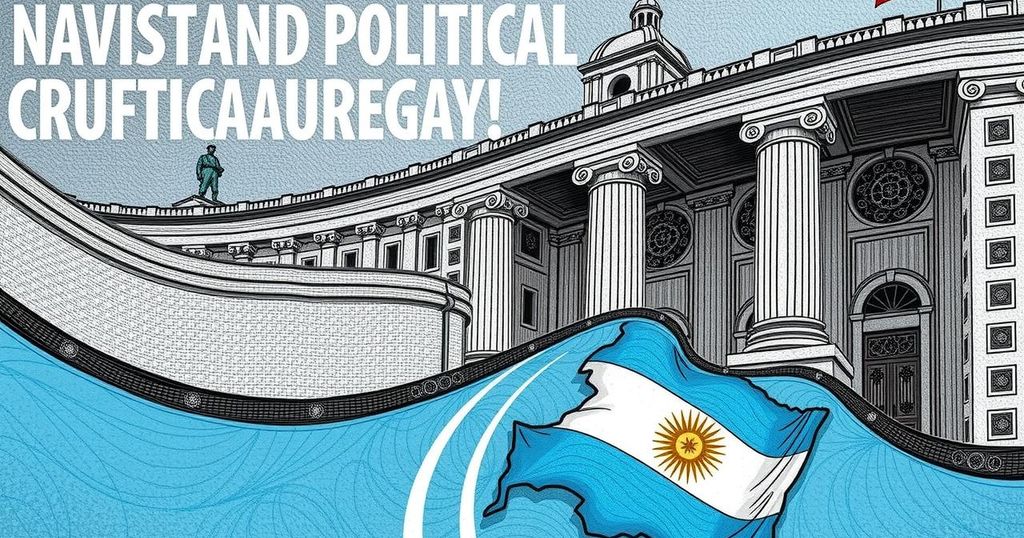González’s Tour: A Bid for International Support Amid Venezuela’s Political Turmoil

Edmundo González Urrutia, Venezuelan opposition leader, is visiting Argentina and Uruguay to seek international support before assuming the presidency on January 10, 2024. His claims of victory in last July’s elections face skepticism from Maduro’s regime, which has issued threats against him. As internal protests are organized, the political climate remains tense, with critical implications for regional geopolitics.
Edmundo González Urrutia, a prominent Venezuelan opposition leader, is touring Argentina and Uruguay to solidify international backing before the expected assumption of the presidency on January 10, 2024. He claims victory in last July’s elections, supported by opposition tallies, and will engage with key political figures, including Uruguayan President Luis Lacalle Pou. Despite the support evident in statements from Uruguay, González’s endeavors are set against a backdrop of political volatility, with Nicolás Maduro’s regime dismissing his electoral claims and placing a bounty on his capture.
In Uruguay, Foreign Minister Omar Paganini confirmed support for González, stating, “Based on the overwhelming evidence, it is clear for Uruguay that Edmundo González Urrutia obtained the majority of votes in the Venezuelan presidential elections.” González’s visit also emphasizes the increased caution among international players following the experience with Juan Guaidó’s parallel presidency declared in 2019. His tour is expanding to key diplomatic locations such as Argentina, Panama, the United States, and the Dominican Republic.
Meanwhile, the situation in Brazil demonstrates a complex stance, where President Luiz Inácio Lula da Silva avoids recognizing Maduro officially but has offered to mediate. This ambiguous approach may facilitate ongoing diplomatic communications with Caracas regardless of developments post-January 10. Back home, the Venezuelan opposition is rallying supporters to demonstrate in favor of González, framing it as an essential act of resistance against the Maduro regime, which continues to face accusations of human rights violations.
The upcoming deadline for international recognition of Venezuela’s presidency intensifies the situation, particularly with the potential for renewed civil unrest in the wake of the political unrest and the Maduro administration’s release of political prisoners. January 10 serves as a significant pivot point for both Venezuela and its neighbors, likely shaping the geopolitical landscape in the region well into the future.
The current political climate in Venezuela is marked by considerable tension between the opposition, led by Edmundo González Urrutia, and the Maduro administration, which has been accused of electoral fraud and heavy-handed tactics to maintain power. The opposition claims González won the presidency in the Jul 2023 elections, although many governments, including Maduro’s, contest this result. González’s tour aims to gather crucial international support to solidify his claim and assert legitimacy leading up to the January 10, 2024 deadline, after which the global community must decide whom to recognize as the legitimate president of Venezuela. Historical context reveals the challenges of international recognition, particularly following Juan Guaidó’s experience in 2019. Countries such as Brazil and Uruguay are navigating their positions delicately, balancing regional cooperation against outright contestation of Maduro’s regime.
In conclusion, Edmundo González Urrutia’s regional tour signifies a critical phase in Venezuela’s political landscape, where international support could determine the legitimacy of his presidency. His engagements in Uruguay and Argentina highlight the divided responses of regional leaders to the ongoing crisis. As the January 10 deadline approaches, the actions of the international community, particularly regarding recognition, will be pivotal for both the opposition’s strategy and the future stability of Venezuela under Maduro’s contested rule.
Original Source: en.mercopress.com







